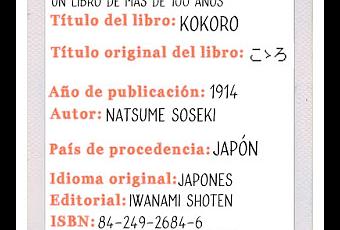

This shattering of innocence, which Sensei described as an inverse of the moment when an adolescent boy sees beauty in the world, especially in women, combined with a budding doubtful nature that Sensei already had, made him turn against the toward with great distrust and disdain. The first is his uncle's cheating him of his inheritance because he and his father had trusted his uncle so much, the betrayal was all the more painful. Sensei's misanthropy develops from two incidents. For Sensei, the narrator, and to an even greater extent for K, the influence of the Western ideal of individualism alienated them from their own societies, in which they would otherwise have been comfortably integrated, and so made them painfully lonely. The common people, such as the narrator's family and Sensei's wife, continued more or less to live by the same duty-intensive Confucian code, but those of the intelligentsia, that is to say those who received university educations, found themselves forced to reconcile two strikingly different ways of approaching the world. The Meiji era inaugurated a period of modernization and Westernization in Japan so rapid that towards its end, when the story takes place, elements of traditional Japanese thinking existed side-by-side the new Western thought.

A man who seems to live against the ideas of the time by squandering his talents in idleness, Sensei gives the narrator sincere advice in life of the sort that he does not find from his other teachers or his father. As the narrator himself says, Sensei was not an obvious or good mentor in any usual way, especially in comparison to the university lecturers whom the narrator encountered as a student.

In fact, the narrator himself instinctively realizes that Sensei is a teacher figure, even a father figure, for him, which makes him impulsively call Sensei 'Sensei'. From the very beginning of the story, even before we the readers become aware of Sensei's emotional depth and life experience, the narrator names him as Sensei, and so we listen attentively to what the man says, trying to understand him. The relationship between the narrator and Sensei, the central relationship in the story, is one of student and, literally, teacher, though a very unconventional one at that.


 0 kommentar(er)
0 kommentar(er)
